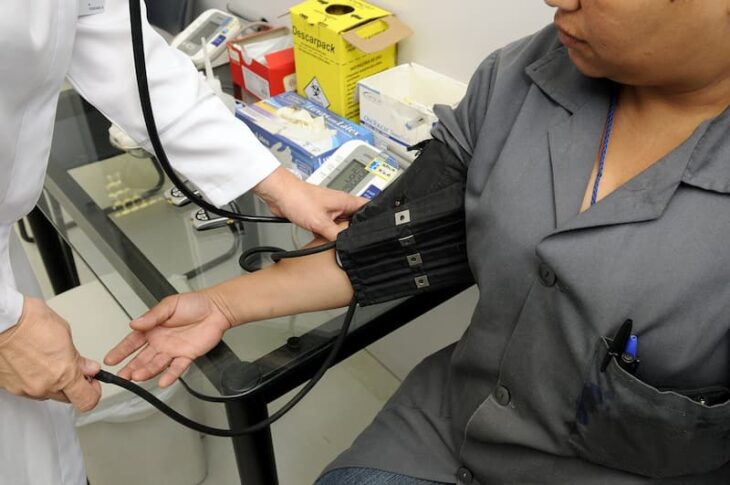Disclosure: Articles may contain affiliate links. As an Amazon Associate, we earn from qualifying purchases (at no additional cost to you). See our full disclosure here.
Last updated on April 4th, 2023 at 09:25 pm
Medical Disclaimer: The content on this site is not intended to be a substitute for professional medical advice, diagnosis, or treatment. It is important to always seek the advice of your physician or other qualified healthcare provider with any questions you may have regarding a medical condition.
A woman’s period is typically a monthly visitor, but some women’s schedules are irregular. When your period is late, or doesn’t come at all, you might assume the most obvious reason is that you’re pregnant. However, that’s not always the case.

There are various medical and lifestyle factors that can affect your period–from hormonal imbalances to more serious medical conditions.
There are also two transitional life stages when having an irregular period is completely normal: around the time of your first menstrual cycle and when you’re entering menopause. But, if you don’t fall into either of those categories, here are some other possible reasons you may have a missed period but are not pregnant.

Missed Period But Not Pregnant? It Could Be…
Stress
Experiencing stress can not only affect your mood and daily routine, but can also influence the hormones that are responsible for your period.
Intense stress can interrupt the production of the hormone that regulates your ovulation and menstrual cycle, gonadotropin-releasing hormone or GnRH. To maintain your overall health, try relaxation techniques, lifestyle changes, or seek out cognitive behavioral therapy.
Sudden weight gain
Sudden weight gain can impact your health in many ways, including your menstrual cycle.
Being overweight is one cause of irregular periods, as excessive weight gain can affect estrogen and progesterone regulation. This can even cause fertility issues.
The solution is to get back to a healthy weight, so hormone levels can return to normal.
Sudden weight loss
Sudden weight loss can also disrupt your cycle. When your body lacks necessary fat and calories, it cannot properly produce the hormones needed for ovulation.
The best way to battle this is to gain weight in a healthy way. However, if you have an eating disorder, like anorexia, you must seek treatment.
Excessive exercise
Going overboard with intense exercise can affect your pituitary and thyroid glands, possibly impacting your menstrual cycle. It can also bring about the release of higher levels of stress hormones.
Regular exercise that lasts around one to two hours does not usually cause hormonal changes, but high-intensity workouts for hours at a time may present an issue.
Consult your doctor or sports medicine healthcare provider to discuss an exercise plan that will help you meet your fitness goals in a safe way.
Illness
A chronic illness is also a common reason for missed periods. This can include celiac disease, diabetes, liver dysfunction, and pituitary tumors, to name a few.
Changing blood sugar levels, as well as poor absorption of nutrients that can be caused by some of these illnesses can have a significant impact on the menstrual cycle.

Medications
Medications can be another reason you have a missed period but are not pregnant. Antidepressants, antipsychotics, thyroid medications, anticonvulsants, and chemotherapy medications are some of the medicines that can disrupt your cycle.
Of course, birth control medications can also affect your period–some may cause a heavier, lighter, or no flow at all.
Usually, your cycle will return to normal after the medication is stopped. If it’s been more than three months, consult your doctor.
PCOS
Polycystic ovary syndrome (PCOS) is a condition wherein the female body produces more of the male hormone, androgen, than usual, resulting in cysts forming in the ovaries.
This causes irregular periods or may completely stop your periods. PCOS also affects the metabolism putting you at higher risk for type 2 diabetes and other serious conditions. You will need to discuss treatment options with your doctor.

Don’t ignore a missed period
It is normal to worry when you have a missed period, since this may be an indication that something’s not right. Your best course of action is to contact your doctor who can help you determine if there’s a problem and if any kind of treatment or lifestyle changes are in order.
Also read:
Self-Care Checklist Printable (Free)
Try One of These 11 Stress-Relieving Hobbies (& Why You Should)
Managing Stress as a Busy Mom: 5 Tips to Try Now
You can also find MomsWhoSave on Facebook, Instagram, and Twitter. Join us for updates.
Don’t miss a thing! Subscribe to MomsWhoSave’s newsletter.
Leave a Reply